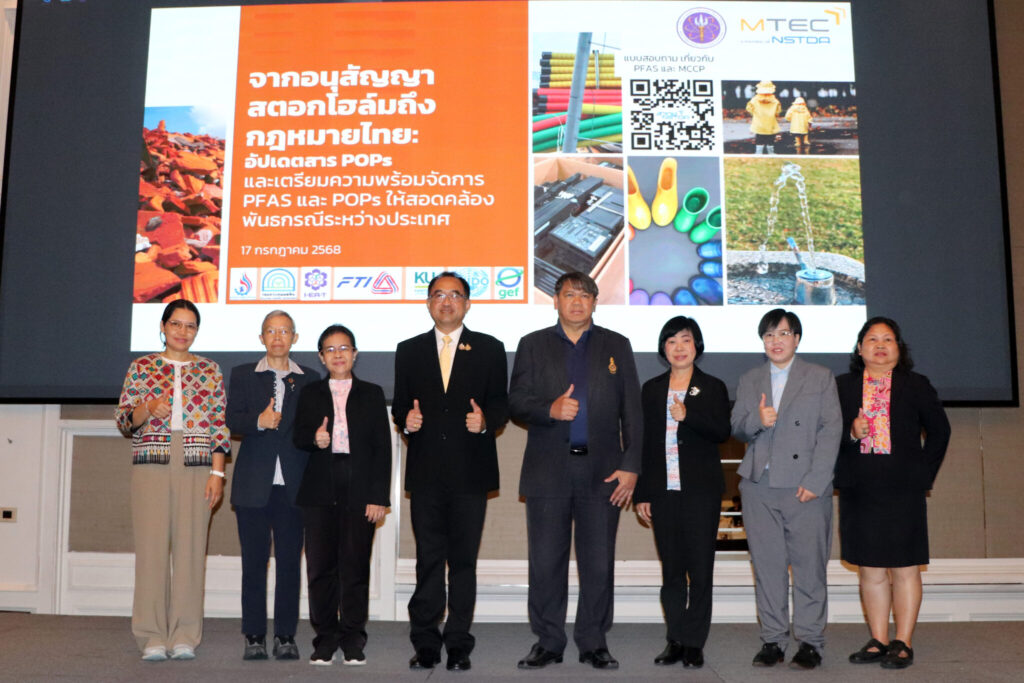
July 17, 2025
Centara Grand at Central Ladprao, Bangkok
The National Metal and Materials Technology Center (MTEC), under the National Science and Technology Development Agency (NSTDA) and the Ministry of Higher Education, Science, Research and Innovation (MHESI), convened a technical seminar and public consultation titled:
“From the Stockholm Convention to Thai Legislation: Updates on POPs and Preparing for PFAS and POPs Management in Line with International Commitments.”
This event was part of a collaborative project commissioned by the United Nations Industrial Development Organization (UNIDO), with active participation from the Pollution Control Department, Department of Industrial Works, Industrial Estate Authority of Thailand, the Federation of Thai Industries, and Kasetsart University.
Designed to strengthen national preparedness for managing persistent organic pollutants (POPs), the seminar aimed to support government agencies and key stakeholders in aligning with global environmental obligations while advancing long-term health and ecological safety.
The session was formally opened by Mr. Thananchai Wannasuk, Deputy Director-General of the Pollution Control Department, and moderated by Dr. Witchuda Daud, researcher with the Advanced Polymer Technology Research Group at MTEC–NSTDA. The event attracted robust engagement, with over 100 participants onsite and more than 300 joining online.
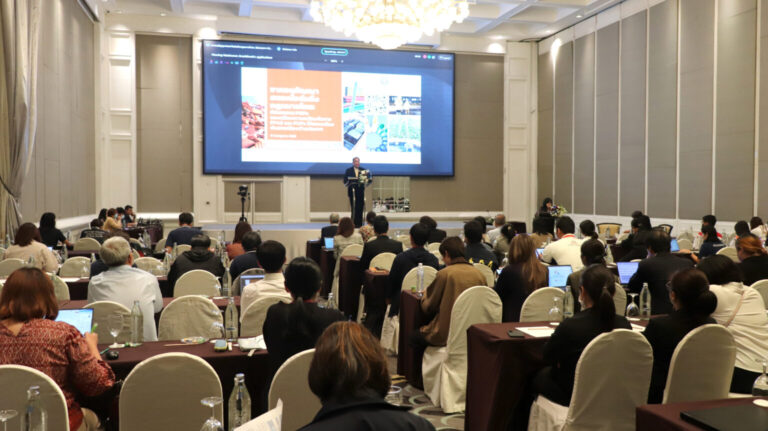
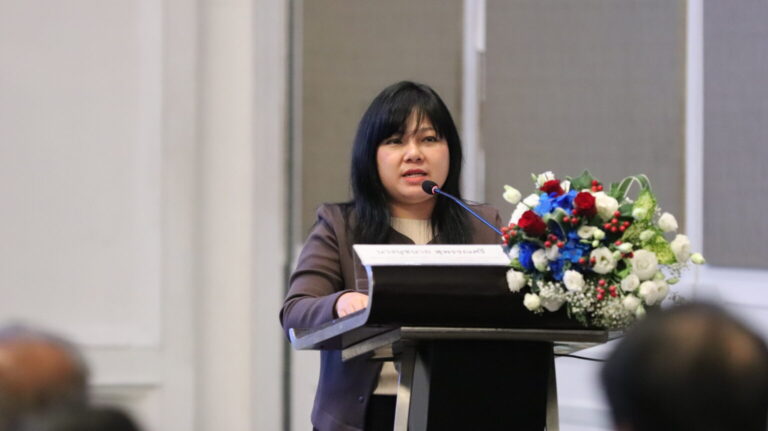
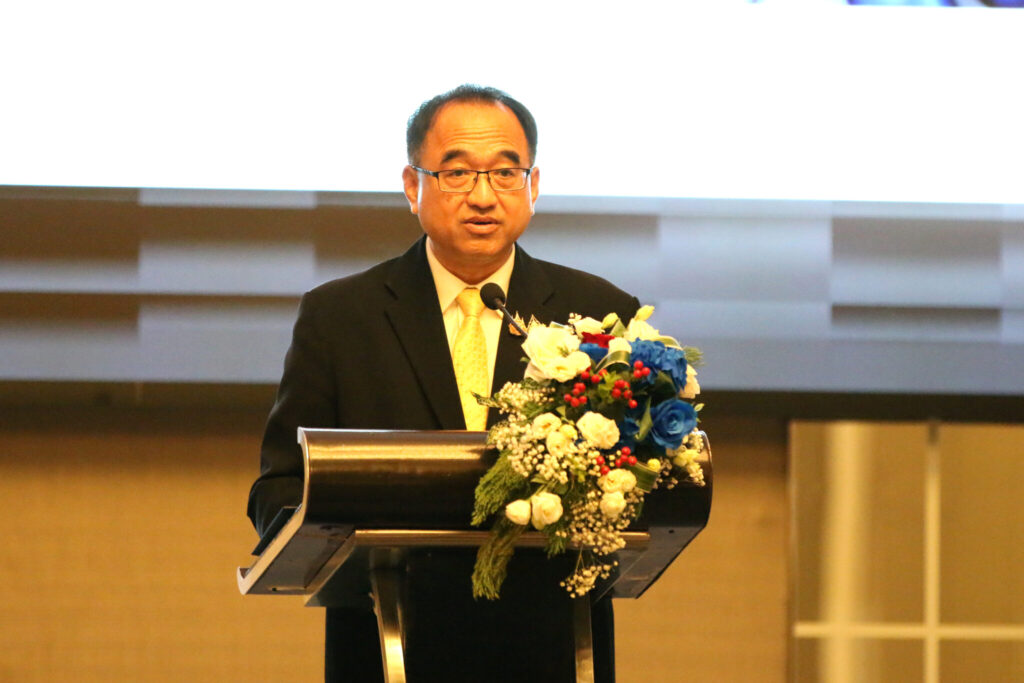
Mr. Thananchai Wannasuk, Deputy Director-General of the Pollution Control Department, affirmed that the seminar and public consultation titled “From the Stockholm Convention to Thai Legislation: Updates on POPs” represents a key component of Thailand’s ongoing efforts to promote environmentally sustainable industrial development and reduce emissions of persistent organic pollutants (POPs). These efforts are aligned with the core objectives of the Stockholm Convention, which seek to minimize and ultimately eliminate the production, use, and release of POPs.
He noted that the Pollution Control Department serves as the lead national agency in advancing this agenda. The event, he emphasized, reflects a collaborative undertaking among government bodies, the private sector, and the United Nations Industrial Development Organization (UNIDO). Its purpose is threefold: to share outcomes from the 12th Meeting of the Conference of the Parties to the Stockholm Convention; to present Thailand’s national implementation plan, and to gather public feedback on the draft National Action Plan for the management and disposal of POP-contaminated materials.
Mr. Thananchai concluded by underscoring the importance of fostering a shared vision across all sectors for the sound management of chemicals and waste throughout their life cycle—an essential step toward the long-term reduction and eventual elimination of POPs in accordance with the objectives of the Stockholm Convention.
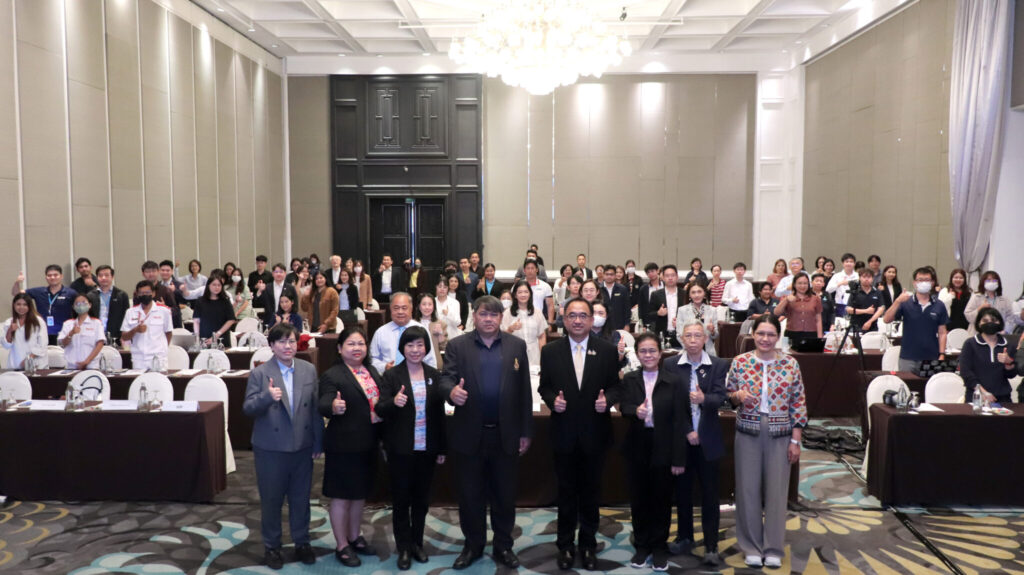
Update on outcomes from the 12th Conference of the Parties (COP-12) to the Stockholm Convention
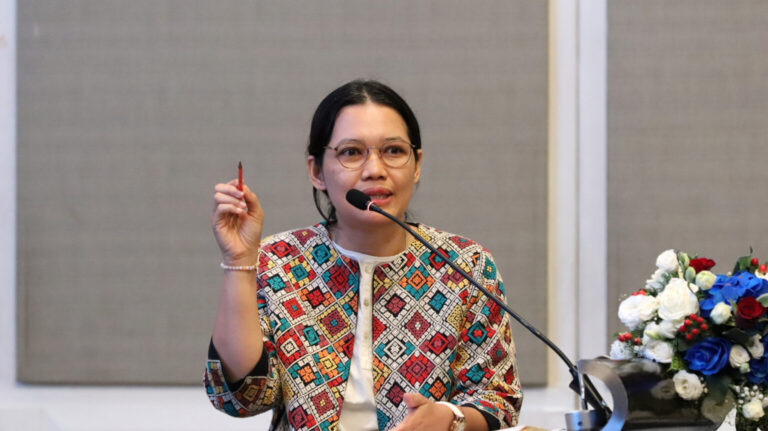
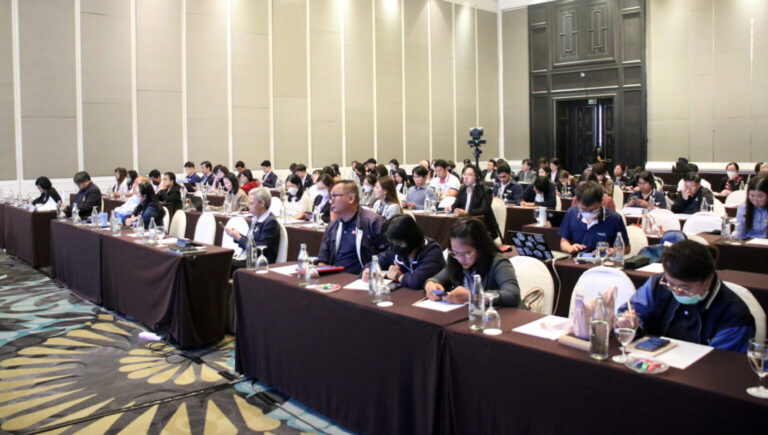
Ms. Piyanan Udomtang, an Environmentalist at the Senior Professional Level within the Hazardous Substances Division of the Waste and Hazardous Substances Management Bureau, Pollution Control Department, delivered the outcomes of the 12th Conference of the Parties to the Stockholm Convention (COP-12). Key decisions covered the listing of new persistent organic pollutants (POPs) and associated exemptions (SC 12/9–15), measures designed to reduce and eliminate releases from waste (SC 12/6), and the work plan for the Compliance Committee for 2026–2027 (SC 12/22).
“The Stockholm Convention’s primary objective is to safeguard human health and the environment from harmful chemicals by curbing, phasing out, and regulating the production, use, and release of POPs,” she remarked.
To date, thirty-seven substances have been classified as POPs under the Convention. At SC COP-12, three new groups of substances—Chlorpyrifos, MCCPs (medium-chain chlorinated paraffins), and Long-chain PFCAs (perfluorocarboxylic acids)—were added to Annex A, which prohibits their production and use, subject to certain exemptions. Furthermore, the exemption conditions for UV-328 underwent revision.
The meeting also examined measures for POP waste management and highlighted the importance of monitoring compliance with the Convention. As a Party to the Convention, Thailand is required to formulate and enforce control and management measures in accordance with these international obligations.
Regulatory Approaches to POPs under the Hazardous Substances Act
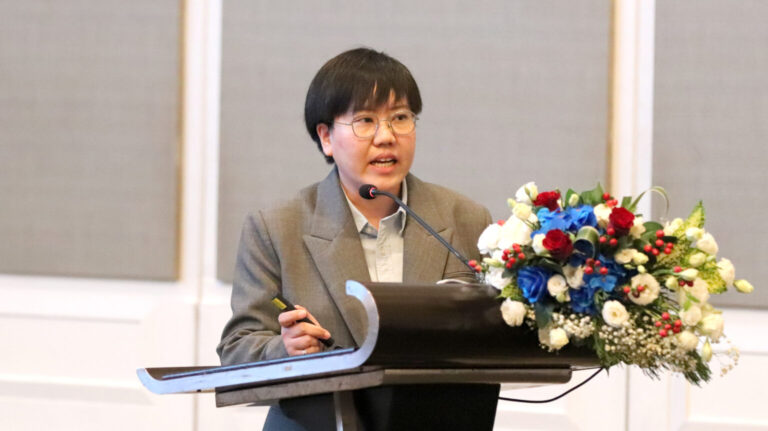
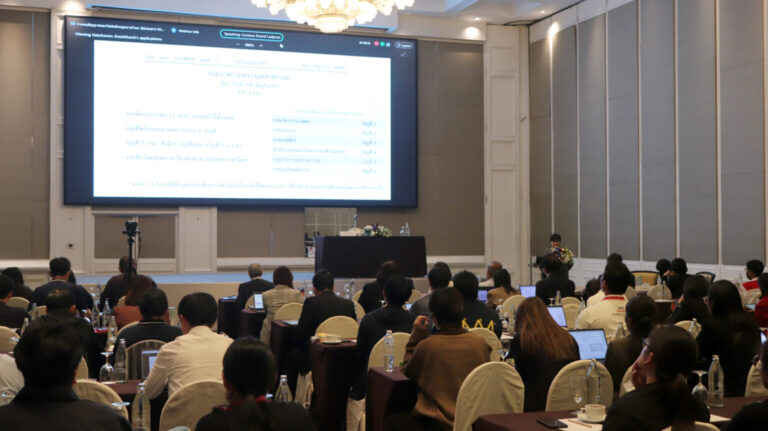
Ms. Jananya Aonsri, Director of the Technical Affairs and Secretariat Group for the Hazardous Substances Committee, at the Department of Industrial Works, gave a presentation on regulatory approaches to POPs under the Hazardous Substances Act.
She noted, “Currently, the Act classifies hazardous substances into four categories based on risk level and regulatory requirements:
- Type 1 – Notification of required factual information
- Type 2 – Notification to authorities mandatory
- Type 3 – License necessary
- Type 4 – Strictly prohibited from production, import, export, transit, or possession.
She further remarked that the most recent edition of the Hazardous Substances List (2025) has undergone revision to offer broader and more comprehensive coverage, particularly in relation to Persistent Organic Pollutants (POPs), with expanded regulatory listings being considered.
Ms. Jananya emphasized that enterprises must rigorously adhere to legal requirements and urged operators to verify their chemical substances through the online chemical consultation system available at http://haz3.diw.go.th/hazvk/.
Management of POPs-Contaminated Waste
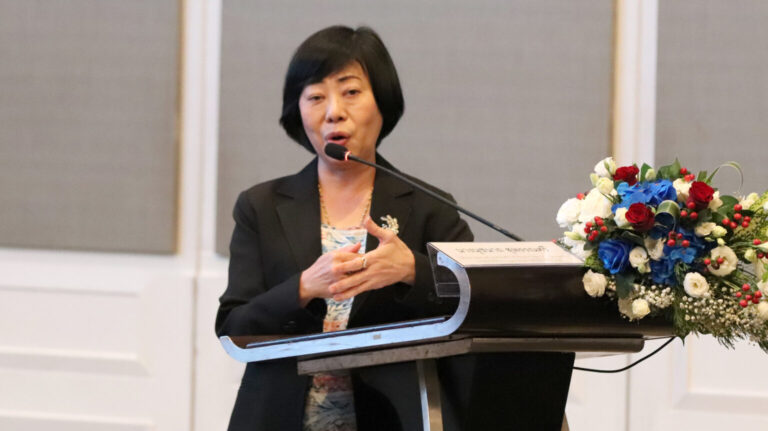
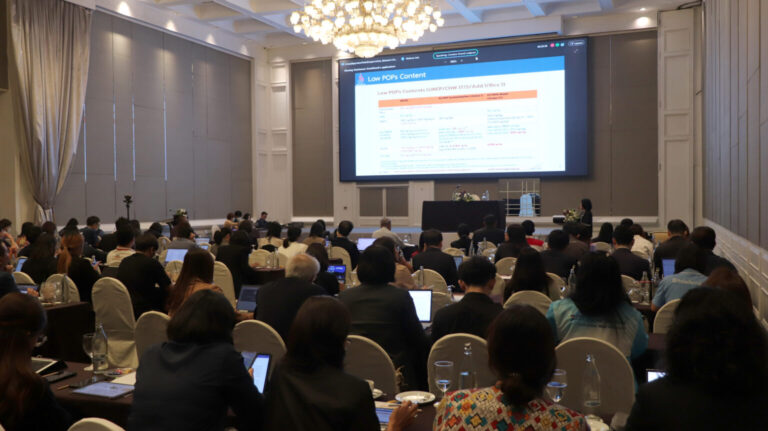
Ms. Nuchanat Suphansri, an expert in industrial waste treatment and management technologies at the Department of Industrial Works, outlined waste management strategies and key considerations for handling POPs-contaminated waste.
Managing POPs-contaminated waste is a crucial process that demands strict oversight from beginning to end. It extends beyond just disposing of waste; it must be executed systematically and thoroughly, encompassing all stages from classification, collection, and transportation to treatment, monitoring, and verification. This is essential for containing the spread of hazardous substances and reducing risks to both the environment and public health sustainably.
Each step in the process must strictly comply with legal frameworks and be reinforced by effective oversight systems. Appropriate technologies should be chosen based on the type of waste, and all parties involved, including waste generators, transporters, treatment providers, and regulatory agencies, must clearly recognize their responsibilities. This ensures that the waste management process is safe, comprehensive, and lessens long-term impacts on the environment and society as a whole,” she affirms.
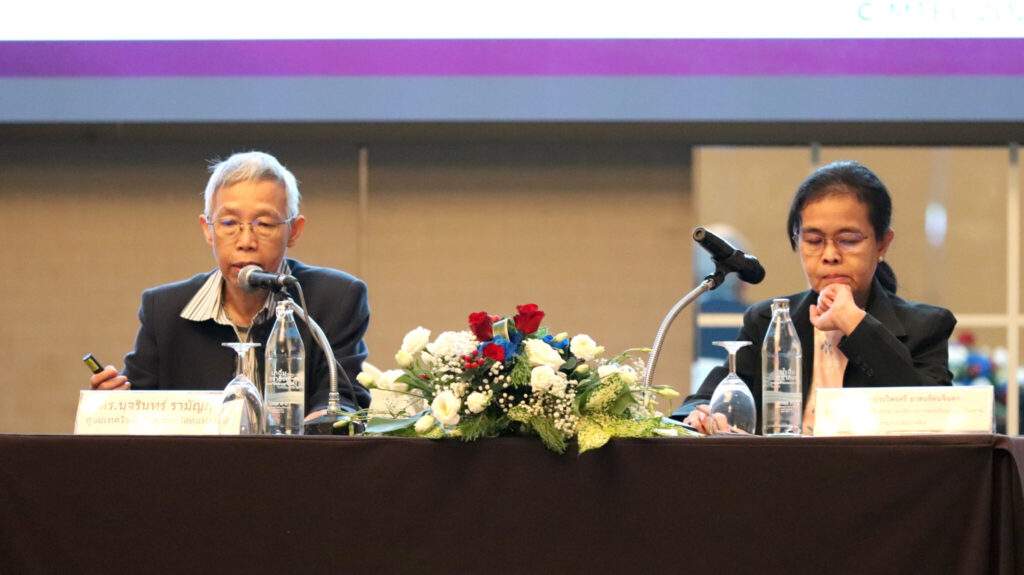
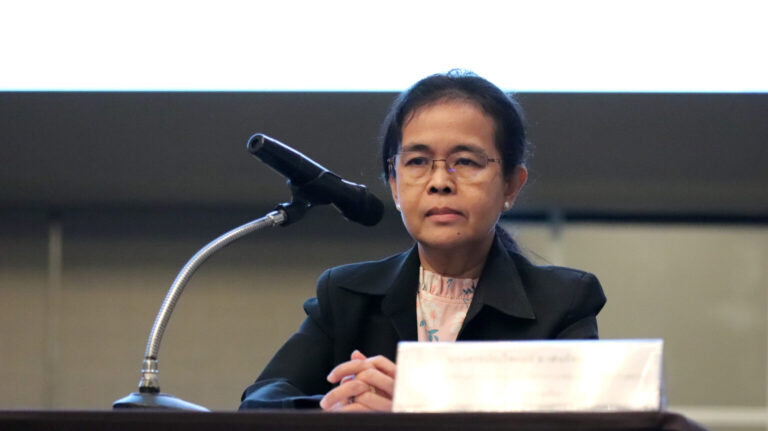
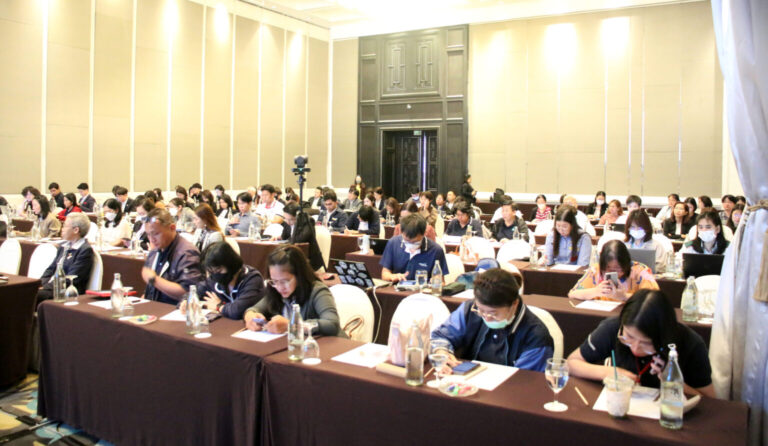
Ms. Prapaisri Asanrattanajinda, Director of the Hazardous Substances Division, Pollution Control Department, spoke on key issues related to the registration of “special exemptions” for the MCCPs group of POPs.
“Under the Stockholm Convention, registering special exemptions grants Thailand a transitional period to implement alternative substances or production processes to eliminate the use of MCCPs. The registration process demands cooperation from the industrial sector to submit information on proposed exemptions for the production and use of MCCPs.
This covers control measures for environmental emissions, protection of workers’ health, and monitoring of contamination. All information must be submitted for review by the national committee before being sent to the Secretariat of the Convention. The exemption period is limited to a maximum of five years and may be renewed for another five years if justified and approved by the Conference of the Parties,” she stated.
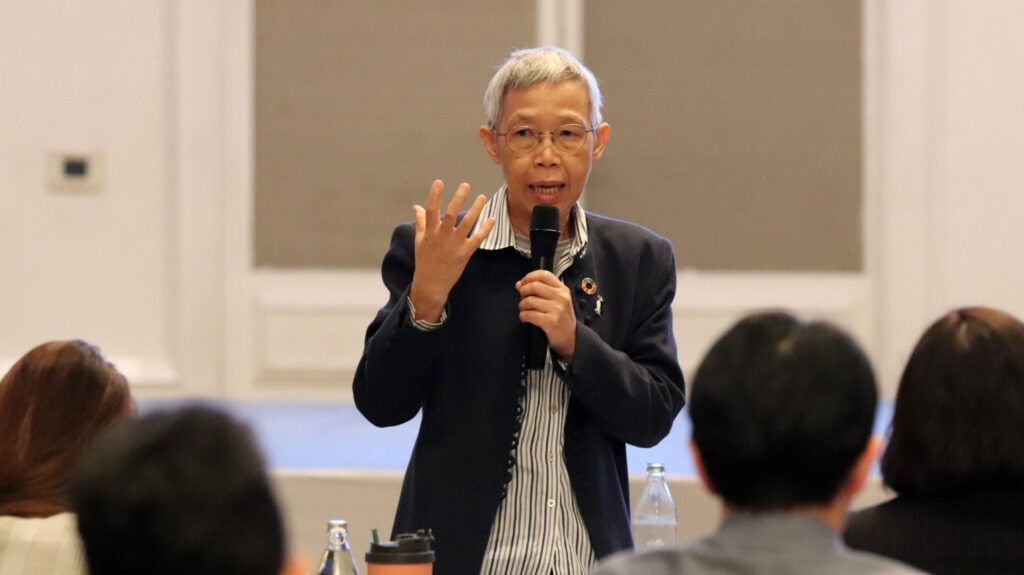
Dr. Nudjarin Ramungul, Senior Expert at MTEC–NSTDA, introduced the Draft National Action Plan for the management and disposal of materials contaminated with POPs. aligning Thailand’s efforts with international obligations.
“The plan focuses on the systematic management and elimination of persistent organic pollutants (POPs), particularly prevalent in industrial settings —such as decaBDE, PFAS, and MCCPs—commonly found in electrical equipment, firefighting foams, and certain types of plastics,” she explained.
The plan aims to strengthen legal and regulatory frameworks, enforce controls on production, importation, and marketing of POP-containing products, prohibit the recycling of materials exceeding contamination thresholds, and expand national laboratory capacity for POPs detection and monitoring. It also advances economic incentives and public communication to establish a fully integrated and effective POPs management system.
The plan centers around six core strategies, including infrastructure enhancement, material flow control, and multi-sector stakeholder collaboration. These strategies are designed to accelerate the shift toward a circular economy while mitigating long-term health and environmental risks
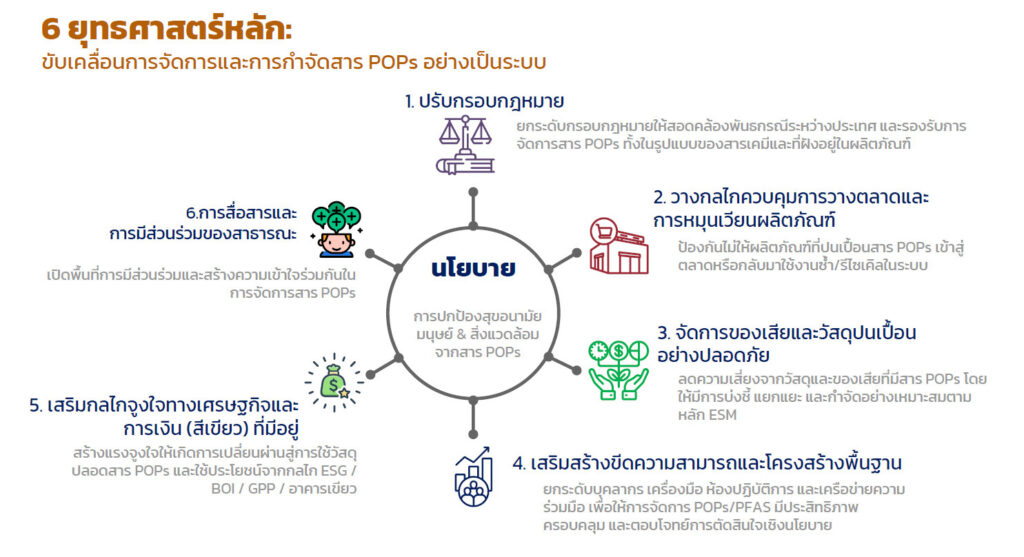
Participant Feedback and Discussion
During the seminar, participants reviewed key information and the draft National Action Plan, which led to a constructive exchange of ideas and recommendations. These contributions are valuable for refining the plan to ensure it is comprehensive and aligned with Thailand’s specific context, ultimately strengthening the country’s capacity to effectively manage and eliminate Persistent Organic Pollutants (POPs) in a sustainable way.
For more information and updates on POPs and circular economy initiatives, please visit www.mtec.or.th/smartcircular or contact DE4CE@mtec.or.th.
